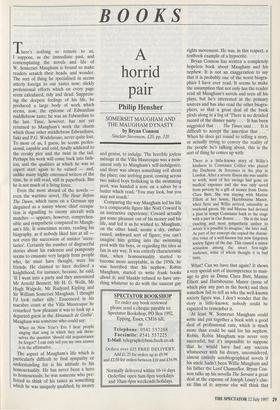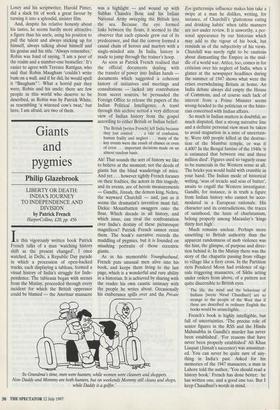BOOKS
A horrid pair
Philip Hensher
SOMERSET MAUGHAM AND THE MAUGHAM DYNASTY by Bryan Connon Sinclair-Stevenson, £20, pp. 320 There's nothing so remote to us, I suppose, as the immediate past, and contemplating the novels and life of W. Somerset Maugham is bound to make readers scratch their heads, and wonder. The sort of thing he specialised in seems utterly foreign to our tastes now; slickly professional efforts which on every page seem calculated, tidy and dead. Suppress- ing the deepest feelings of his life, he produced a large body of work which seems, now, the epitome of Edwardian middlebrow taste; he was an Edwardian to the last. Time, however, has not yet returned to Maugham's work the charm which those other middlebrow Edwardians, Said and P.G. Wodehouse, never quite lost. To most of us, I guess, he seems profes- sional, capable and cold, fatally addicted to the creaky plot and the twist in the tail. Perhaps his work will come back into fash- ion, and the qualities at which he was so expert start again to be valued — and, unlike many highly esteemed writers of the time, he is still read, still in paperback. But he is not much of a living force.
Even the most absurd of the novels even the wartime novel, The Hour Before The Dawn, which turns on a German spy disguised as a nanny whose chief occupa- tion is signalling to enemy aircraft with matches — appears, however, comprehen- sible and sympathetic compared to Maugh- am's life. It sometimes seems, reading his biography, as if nobody liked him at all not even the succession of sinister 'secre- taries'. Certainly the number of disgraceful stories about his rudeness and pomposity seems to emanate very largely from people who, he must have thought, were his friends. He claimed to have declined a knighthood, for instance, because, he said, `If I went into a party and they announced Mr Arnold Bennett, Mr H. G. Wells, Mr Hugh Walpole, Mr Rudyard Kipling and Sir William Somerset Maugham, I thought I'd look rather silly.' Ensconced in his macabre court at the Villa Mauresque he remarked 'how pleasant it was to look up a departed guest in the Almanach de Gotha'. Maugham was someone who could say:
When on New Year's Eve I hear people singing that song in which they ask them- selves the question 'should old acquaintance be forgot?' I can only tell you my own answer is in the affirmative.
The aspect of Maugham's life which is particularly difficult to find sympathy or understanding for is his attitude to his homosexuality. He has never been a hero to homosexuals; he was someone who pre- ferred to think of his tastes as something which he was uniquely qualified, by money and genius, to indulge. The horrible joyless menage at the Villa Mauresque was a mon- ument only to Maugham's self-indulgence, and there was always something evil about the place; one arriving guest, coming across two naked boys frolicking in the swimming pool, was handed a note on a salver by a butler which read, 'You may look, but you may not touch.'
Comparing the way Maugham led his life to a comparable figure like Noel Coward is an instructive experience; Coward actually got some pleasure out of his money and his life, and led it as he wished to. Maugham, on the other hand, seems a dry, embar- rassed, awkward sort of figure; you can't imagine him getting into the swimming pool with the boys, or regarding the idea as fun in any way. It was entirely characteristic that, when homosexuality started to become more acceptable, in the 1950s, he was horrified that his nephew, Robin Maugham, started to write frank books about it, and blankly refused to have any- thing whatever to do with the nascent gay rights movement. He was, in this respect, a textbook example of a hypocrite.
Bryan Connon has written a completely hopeless book about Maugham and his nephew. It is not an exaggeration to say that it is probably one of the worst biogra- phies I have ever read. It seems to make the assumption that not only has the reader read all Maugham's novels and seen all his plays, but he's interested in the primary sources and has also read the other biogra- phers, so that a great deal of the book plods along in a fog of 'There is no detailed record of the dinner party . . . It has been suggested that . . . The Times said . . . It is difficult to accept the assertion that . . . ' When he does get round to telling a story, or actually trying to convey the reality of the people he's talking about, this is the sort of thing he comes up with: There is a little-known story of Willie's kindness to Constance Collier who played the Duchesse de Serennes in the play in London. After a severe illness she was unable to work; most of her savings had gone on medical expenses and she was only saved from poverty by a gift of money from Dame Clara Butt. She was staying with Maxine Elliott at her house, Hartsbourne Manor, when Syrie and Willie arrived, ostensibly as weekend guests. He and Maxine had devised a plan to tempt Constance back to the stage with a part in Our Betters . . . 'He is the least exacting and most sympathetic author to actors it is possible to imagine,' she later said. As part of her concept she copied the distinc- tive voice of a well-known but now forgotten society figure of the day. This caused a minor sensation among the smart first-night audience, some of whom thought it in bad taste.
What? Can we have that again? It shows a very special sort of incompetence to man- age to give us Dame Clara Butt, Maxine Elliott and. Hartsbourne Manor (none of which play any part in the book) and then somehow fail to tell us who the well-known society figure was. I don't wonder that the story is little-known; nobody could be expected to remember it.
At least W. Somerset Maugham could write and put together a book with a good deal of professional care, which is much more than could be said for his nephew, Robin. Robin Maugham was never very successful, but it's impossible to suppose that he would have had any success whatsoever with his dreary, unconsidered, almost entirely autobiographical novels if his uncle hadn't been Willie Maugham and his father the Lord Chancellor. Bryan Con- non talks up his novella The Servant a great deal at the expense of Joseph Losey's clas- sic film of it; anyone else will think that Losey and his scriptwriter, Harold Pinter, did a slack bit of work a great favour by turning it into a splendid, sinister film.
And, despite his relative honesty about his tastes, he seems hardly more attractive a figure than his uncle, using his position to pull the talent and always sticking up for himself, always talking about himself and his genius and his title. 'Always remember,' Robin was fond of saying, 'I am a peer of the realm and a number-one bestseller.' It's easier to agree with Terence Rattigan, who said that Robin Maugham 'couldn't write bum on a wall, and if he did, he would spell it "Baugham" '. What a horrid pair they were, Robin and his uncle; there are few people in this world who deserve to be described, as Robin was by Patrick White, as resembling 'a wizened cow's twat,' but here, I am afraid, are two of them.



























































 Previous page
Previous page